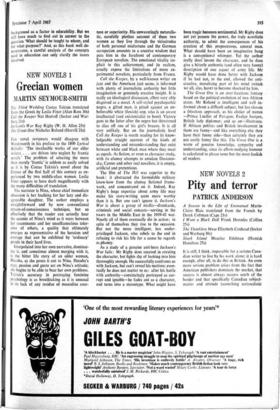NEW NOVELS 1
Grecian women
MARTIN SEYMOUR-SMITH
The Third Wedding Costas Taktsis translated from the Greek by Leslie Finer (Alan Ross 30s) Call the Keeper Nat Hentoff (Secker and War- burg 21s) Jackson's War Ray Rigby (W. H. Allen 25s) The Great One Nicholas Roland (Harvill 21s) Few novel reviewers would disagree with Wordsworth in his preface to the 1800 Lyrical Ballads: 'The invaluable works of our elder writers . . . are driven into neglect by frantic novels.' The problem of selecting the more than merely 'frantic' is seldom as easily solved as it is by Costas Taktsis's novel about the Greece of the first half of this century as ex- perienced by two middle-class women. Leslie Finer appears to have dealt magnificently with the many difficulties of translation.
The narrator is Nina, whose chief immediate obsession is her loathing for her lazy and dis- agreeable daughter. The author employs a straightforward and by now conventional stream-of-consciousness technique, but so effectively that the reader can actually hear the accents of Nina's mind as it veers between her resentments and her unselfconscious toler- ance of others, a quality that ultimately emerges as representative of the heroism and courage that can be exhibited by 'ordinary' people in their hard lives.
Interpolated into her own narrative, dominat- ing it, and sometimes almost merging with it, is the bitter life story of an older woman, Hecuba, as she pours it out to Nina. Hecuba's rage, passion and gusto act on Nina's attitude; she begins to be able to bear her own problems. Taktsis's accuracy in portraying feminine psychology is as breathtaking as it is unusual in its lack of any residue of masculine sour-
ness or superiority. His unwaveringly naturalis- tic, carefully plotless account of these two women as they live through the vicissitudes of both personal misfortune and the German occupation amounts to a creative wisdom that puts him in the forefront of contemporary European novelists. The emotional vitality im- plicit in this achievement, and its realism, cruelly expose the limitations of more ex- perimental novelists, particularly from France.
Call the Keeper, by a well-known writer on jazz and the American jazz scene, is informed with plenty of journalistic authority but little imagination or genuinely creative insight. It is really an ideological discussion, albeit very ably disguised as a novel. A self-styled psychopathic negro, a gifted man, is pitted against an un- believable white (Jewish) cop, who is an aware intellectual (and existentialist to boot). Victory goes to the latter after the negro has threatened to slice off one of his girl's breasts. It is all very unlikely. But on the journalistic level Call the Keeper is worth reading for its know- ledgeable straight account of the kinds of understanding and misunderstanding that exist between white and black man where they meet as equals. As fiction, or even as character study, with its clumsy attempts to emulate Dostoiev- sky, Camus and other real novelists, it is empty, artificial and pretentious.
The film of The Hill was superior to the book: it abstracted the formidable military know-how from the clumsy fictional frame- work, and concentrated on it. Indeed, Ray Rigby's huge expertise about army life may make his story-writing seem more worthy than it is. But one can't ignore it. Jackson's War is about a group of misfits—drunkards, criminals and social outcasts—serving in the NAAFI in the Middle East in the 1939-45 war. Nearly all of them eventually die in action: in spite of themselves they rise to the occasion. But not the more intelligent, less under- privileged Jackson, who rebels to the end in refusing to risk his life for a cause he regards as phoney.
As a study of a genuine anti-hero Jackson's War fails: Mr Rigby does succeed in creating the character, but fights shy of looking into him thoroughly enough. He successfully confronts us with Jackson, but can't reveal his motives; even- tually he does not matter to us: after his battle with authority—convincingly portrayed as cor- rupt and ignoble—he fades out as a character, and turns into a stereotype. What might have been tragic becomes sentimental. Mr Rigby does not yet possess the power, the truly novelistic authority, to admit the consequences of his creation of this preposterous, amoral man. What should have been an imaginative bang is a conventional whimper. Yet the author really does- invent the character, and he does give a bitterly authentic (and often very funny) description of one aspect of army life. Mr Rigby would have done better with Jackson if he had not, in the end, allowed the anti- creative, moralising part of his mind (which we all, alas, have) to become shocked by him.
The Great One is an over-facetious fantasy based on the political evolution of two African states. Mr Roland is intelligent and well in- formed about a difficult subject, but has chosen a frivolous approach, as his choice of names —Prince Lucifer of Paragon; Evelyn Juniper, British lady diplomat; and so on—illustrates. If African politics and British involvement in them are funny—and like everything else they have their funny side—then certainly they are not cosily funny like this. The Great One is a waste of genuine knowledge, sympathy and understanding, since its elbow-nudging humour is calculated to please none but the most foolish of readers.






























 Previous page
Previous page